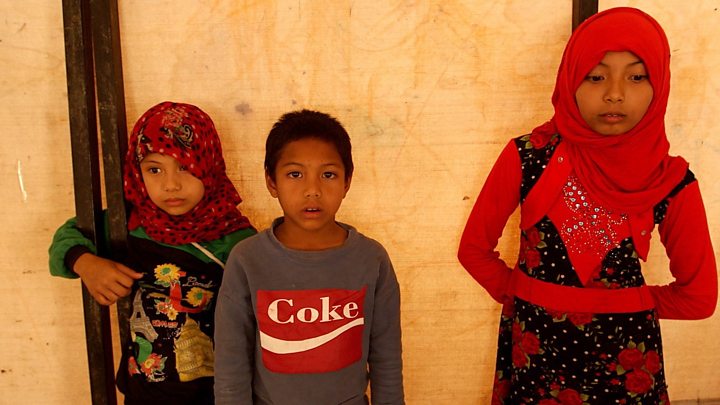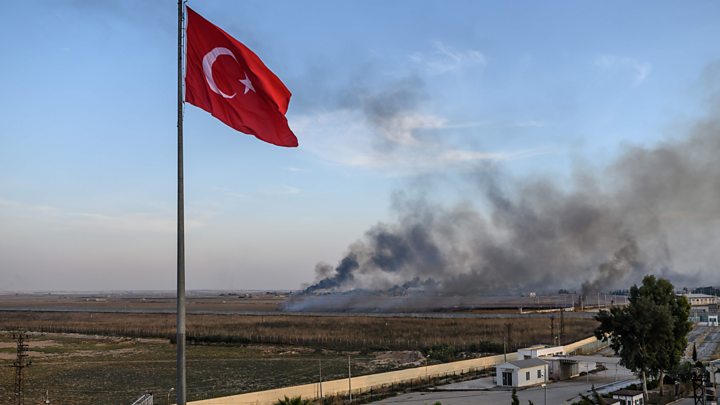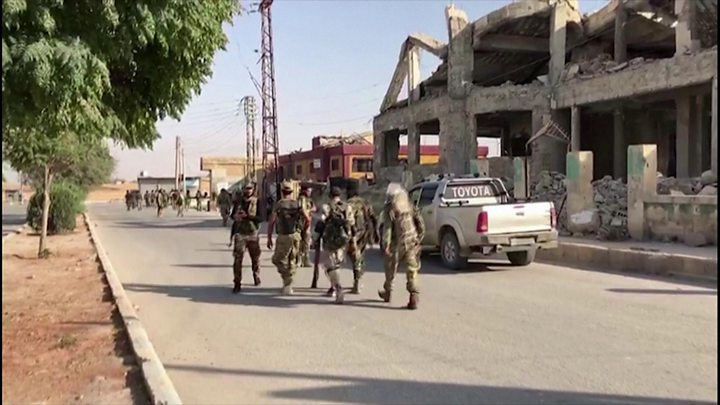Home » Middle East »
Turkey advance forces US pullout from north Syria
The US is pulling out all of its troops from northern Syria as Turkey advances its operation against the Kurds.
Defence Secretary Mark Esper said Turkey “likely intends” to extend its attack further than originally planned.
The assault is aimed at forcing out Kurdish forces – the main US ally in the area. They may be seeking help from Syria and Russia, said Mr Esper, and the US would not be defending them.
Later the Kurds said they had agreed Syria would deploy troops in the area.
Syrian state TV had already announced the army was heading north to confront Turkish forces.
More than 130,000 people have fled homes near the conflict, the UN said, warning the figure could soon triple.
The Syrian Democratic Forces (SDF), the Kurdish-led fighters under attack from Turkey, warned last week that they would no longer be able to guard suspected IS members and their families in camps and prisons under their control if the Turkish offensive continued.
And on Sunday, Kurdish officials said nearly 800 relatives of foreign IS members had escaped from Ain Issa, a camp in the north, as clashes raged nearby.
The Turkish offensive, which started last week, has drawn an international outcry, as the SDF were the main Western allies in the battle against IS in Syria.
But Turkey views the Kurdish groups within the force as terrorists and says it wants to drive them away from a “safe zone” reaching 30km into Syria.
It plans to resettle more than three million Syrian refugees currently in Turkey within the zone – many of whom are not Kurds. Critics have warned this could lead to ethnic cleansing of the local Kurdish population.
What’s behind the US troops decision?
The situation in Syria is becoming “very untenable”, US Defence Secretary Mark Esper told CBS’s Face the Nation on Sunday.
“In the last 24 hours, we learned that the Turks likely intend to extend their attack further south than originally planned, and to the west,” he told CBS’s Face the Nation.
President Recep Tayyip Erdogan said on Sunday the aim of the incursion was to establish a “security zone” that would extend from Kobane in the west to Hassakeh in the east, about 30km deep into Syrian territory.
While he said this was “in line” with the safe zone map originally proposed, Hassakeh lies more than 70km away from the Turkish border.
Mr Esper said the decision to withdraw the nearly 1,000 US troops from northern Syria was made after discussions with his national security team and US President Donald Trump.
He was unable to give a timeframe for the withdrawal and did not specify where the troops would be moved to next.
According to him, the SDF are “looking to cut a deal” with the Syrian government and its Russian allies to counter the Turkish attack.
This, he said, would leave the US forces stuck between “two opposing advancing armies”.
Hours after his comments, the Syrian army was reported by state media to have been deployed to the north to “confront a Turkish aggression” on Syrian territory. It is not yet clear where exactly the troops are being sent.
President Trump’s decision last week to move some of his troops from pockets in the north-east of Syria effectively paved the way for the Turkish operation against the Kurdish fighters, who have lost the protection of their US allies.
On Sunday, he tweeted that it was “very smart” not to be involved in the fighting “for a change”.
The US defence secretary’s announcement of a “deliberate withdrawal” of US troops from northern Syria underscores the pace at which the situation on the ground is deteriorating.
Amid heavy fighting, wayward shelling, alleged war crimes, and reports of IS supporters breaking out from camps and holding centres, Washington has clearly decided it cannot stand against Turkey’s determination to see this operation through.
Interestingly, Mark Esper also noted that in the past 24 hours the US had learned that the Turks “likely intended to expand their attack further south than originally planned and to the west”.
This is clearly what is seen as threatening US forces, and it risks additional humanitarian suffering and the escape of more IS fighters.
His reference to the largely-Kurdish SDF forces seeking alliances with the Syrian regime and Russia – Syria’s main backer and a major player in the conflict – illustrates that the regional ramifications of this crisis are becoming ever more dangerous.
What’s the latest?
Turkey is pushing deeper into northern Syria.
On Sunday, President Erdogan said his forces had already captured 109 sq km (42 square miles) of territory, including 21 villages.
He told reporters the key border town of Ras al-Ain had come under Turkish control – though the SDF said they had pushed Turkish forces back to the town’s outskirts.
Mr Erdogan said Turkish forces had also besieged the town of Tal Abyad, some 120km (75 miles) away.
The UK-based monitoring group the Syrian Observatory for Human Rights (SOHR) said Turkey was in almost complete control there.
Both Ras al-Ain and Tal Abyad are key goals in the Turkish offensive against the Kurdish-led SDF forces.
Turkey also announced that its Syrian allies on the ground had seized a key motorway – called M4 – some 30-35km south of the border.
What are the casualty figures?
They’re rising, with civilians killed on both sides of the border:
What about IS?
The fighting has spilled over to areas close to IS detainee camps, and there are fears the Kurdish forces will be unable to keep them in check.
On Sunday, Kurdish officials at the Ain Issa camp said nearly 800 relatives of foreign IS members had escaped, as clashes raged nearby.
The SOHR said the number of people who fled was 100. It not known where they have fled to.
The camp holds about 12,000 displaced people, previously including nearly 1,000 foreign women and children with jihadist links.
The SDF says it is currently holding more than 12,000 suspected IS members in seven prisons, and at least 4,000 of them are foreign nationals. The exact locations have not been revealed, but some are reportedly close to the Turkish border.
IS has claimed recent car bombings and on Saturday declared a new campaign in Syria, which it said was to avenge its members’ detention in Kurdish-run prisons.
Turkey says it will take responsibility for IS prisoners it finds during its offensive.
Source: Read Full Article





